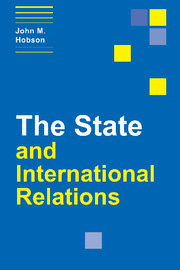Book contents
- Frontmatter
- Contents
- List of figures
- Acknowledgements
- 1 What's at stake in the ‘second state debate’? Concepts and issues
- Part 1 Traditional theories of the state and international relations
- Part 2 Recent sociological theories of the state and international relations
- 4 Marxism
- 5 Constructivism
- 6 Weberian historical sociology
- Part 3 Conclusion: proposing a ‘structurationist’ theory of the ‘constitutive’ state and global politics
- References
- Index
5 - Constructivism
Published online by Cambridge University Press: 31 March 2010
- Frontmatter
- Contents
- List of figures
- Acknowledgements
- 1 What's at stake in the ‘second state debate’? Concepts and issues
- Part 1 Traditional theories of the state and international relations
- Part 2 Recent sociological theories of the state and international relations
- 4 Marxism
- 5 Constructivism
- 6 Weberian historical sociology
- Part 3 Conclusion: proposing a ‘structurationist’ theory of the ‘constitutive’ state and global politics
- References
- Index
Summary
Introduction
The purpose of this chapter is not to provide an exhaustive account of the various theories of the state found throughout the already burgeoing constructivist literature. Given that new variants are only now emerging, my purpose must be more modest. Here I present three distinct theories of the state, which cover many, though not all, of the variants found in the extant constructivist literature. Unlike previous chapters, I shall begin with a general introduction to constructivism, before proceeding to examine three key variants and their approaches to the state.
Constructivism versus ‘rationalism’
In the past, IR scholars have tended to divide IR theory into three competing schools: liberalism/pluralism, realism and Marxist structuralism (Banks 1985). But the rise of constructivism reconfigures the traditional ‘trichotomy’ into a dichotomy, comprising constructivism on the one hand and ‘rationalism’ or ‘neo-utilitarianism’ on the other. Now realism, liberalism and Marxism are all placed in the one category of ‘rationalist’ or ‘neo-utilitarian’ approaches. Constructivists critique ‘rationalist’ theory on many grounds.
Constructivists begin by arguing that rationalist theory (not to be confused with English school rationalism) has been excessively materialist and agent-centric. For rationalists, IR appears as the product of agents (usually states) which are imbued with ‘instrumental rationality’.
- Type
- Chapter
- Information
- The State and International Relations , pp. 145 - 173Publisher: Cambridge University PressPrint publication year: 2000



